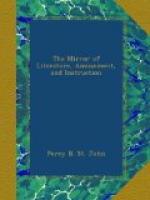to the chief object of his affections. When I
return from an absence, or when he meets an old friend
of mine, or of his own (which is the same thing to
him) his ecstacy is unbounded; he tears and curvets
about the room as if mad; and if out of doors, he
makes the welkin ring with his clear and joyous note.
When he sees a young person in company he immediately
selects him for a play fellow. He fetches a stick,
coaxes him out of the house, drops it at his feet;
then retiring backwards, barking, plainly indicates
his desire to have it thrown for him. He is never
tired of his work. Indeed, I fear poor fellow,
that his teeth, which already show signs of premature
decay, have suffered from the diversion. But
though Rover has a soul for fun, yet he is a game dog
too. There is not a better cocker in England.
In fact he delights in sport of every kind, and if
he cannot have it with me, he will have it on his
own account. He frequently decoys the greyhounds
out and finds hares for them. Indeed he has done
me some injury in this way, for if he can find a pointer
loose, he will, if possible, seduce him from his duty,
and take him off upon some lawless excursion; and it
is not till after an hour’s whistling and hallooing
that I see the truants sneaking round to the back
door, panting and smoking, with their tails knitted
up between their legs, and their long dripping tongues
depending from their watery mouths—he
the most bare-faced caitiff of the whole. In
general, however, he will have nothing to say to the
canine species, for notwithstanding the classification
of Buffon, he considers he has a prescriptive right
to associate with man. He is, in fact, rather
cross with other dogs; but with children he is quite
at home, doubtless reckoning himself about on a level
with them in the scale of rational beings. Every
boy in the village knows his name, and I often catch
him in the street with a posse of little, dirty urchins
playing around him. But he is not quite satisfied
with this kind of company; for, if taking a walk with
any of the family, he will only just acknowledge his
plebeian play-fellow with a simple shake of the tail,
equivalent to the distant nod which a patrician school-boy
bestows on the town-boy school-fellow whom he chances
to meet when in company with his aristocratical relations.
The only approach to bad feeling that I ever discovered
in Rover is a slight disposition to jealousy; but this
in him is more a virtue than a vice; for it springs
entirely from affection, and has nothing mean or malicious
in it, one instance will suffice to show how he expresses
this feeling. One day a little stray dog attached
himself to me and followed me home; I took him into
the house and had him fed, intending to keep him until
I could discover the owner. For this act of kindness
the dog expressed thanks in the usual way. Rover,
although used to play the truant, from the moment the
little stranger entered the premises, never quitted
us till he saw him fairly off. His manner towards




